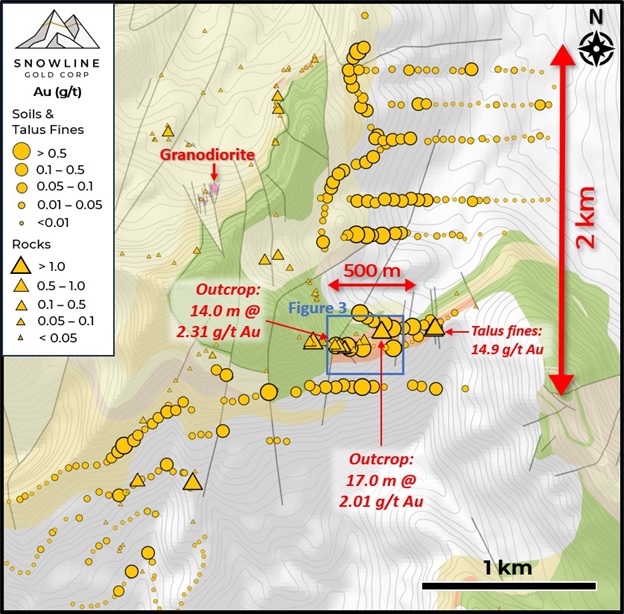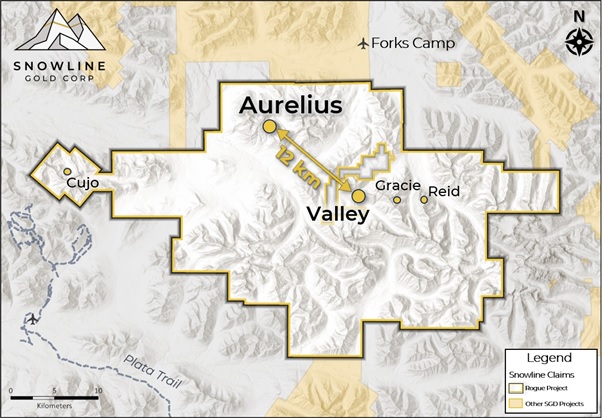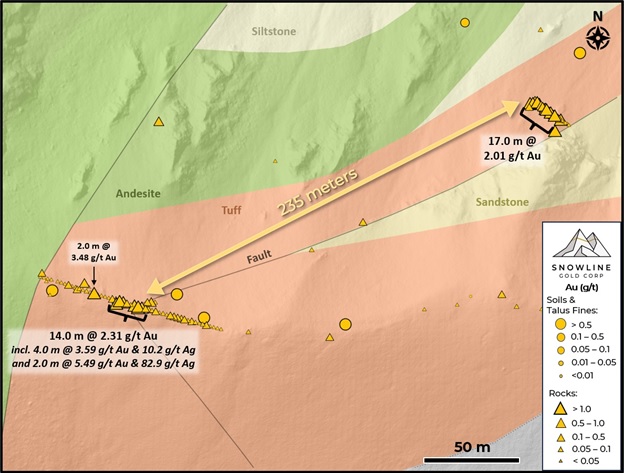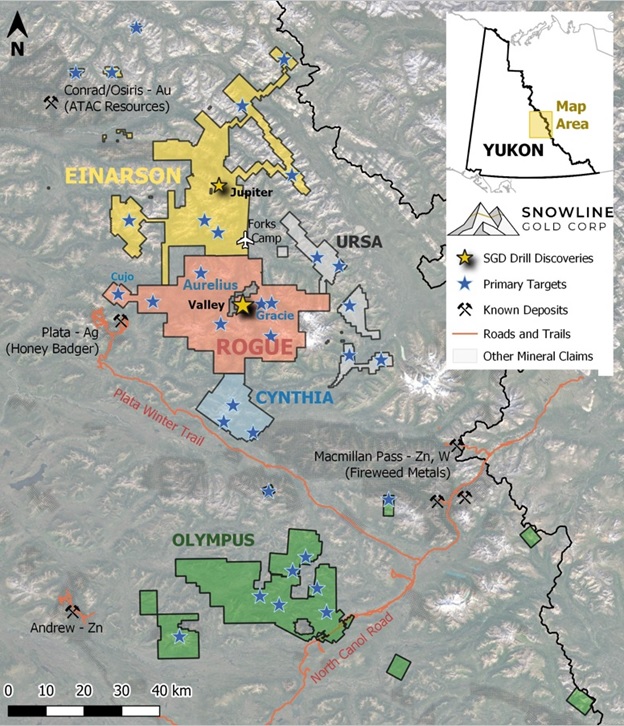Financial News
Snowline Gold Locates New Reduced-Intrusion Related Gold Target With Outcrop Samples to 2.0 Grams per Tonne Gold Over 17.0 M Within Open 2 km Soil Anomaly at Its Rogue Project, Yukon
- Newly discovered 2,000 m by 500 m zone of anomalous gold values in soil and talus fines samples on Rogue Project's "Aurelius" target, 12 km northwest of Valley target
- Two outcrop chip samples average 2.01 g/t Au over 17.0 m and 2.31 g/t Au over 14 m respectively (true widths unknown)
- Mineralization hosted in altered sedimentary and volcanic rocks near outcropping granodiorite.
VANCOUVER, BC / ACCESSWIRE / February 20, 2024 / SNOWLINE GOLD CORP (TSXV:SGD)(OTCQB:SNWGF) (the " Company " or " Snowline ") is pleased to announce discovery of a new reduced-intrusion related gold system (RIRGS) target 12 km from its Valley discovery on its Rogue Project in the Yukon Territory, Canada. Analytical results received from the 2023 surface exploration program at the Company's new Aurelius target reveal an open, 2,000 m long by up to 500 m wide zone of anomalous gold values in talus fines and soils, with concentrations of up to 14.9 g/t Au complemented by anomalous values for RIRGS pathfinder elements bismuth and tellurium. Rock chip samples from outcrops roughly 235 m apart averaging 2.01 g/t Au over 17.0 m (open) and 2.31 g/t Au over 14.0 m (true widths not known) demonstrate the potential for significant scale and a local source to the anomaly. Based on these results, Aurelius is a high priority exploration target at Rogue and a potential drill target in Snowline's upcoming 2024 exploration program.

"We are excited to see such strong and consistent gold numbers from the field team's discovery at Aurelius," said Scott Berdahl, CEO & Director of Snowline. "The scale, consistency and geochemistry of the surface anomaly-which remains open-demonstrates a strong gold-bearing hydrothermal system driven by a nearby intrusion. The outcrop samples show that the country rock hosts gold mineralization, a typical feature of reduced-intrusion related gold systems. Thus, we have two immediate exploration targets: country rock-hosted mineralization directly outcropping at Aurelius and driving the gold anomalism over a large area, and the potential for an intact, near-surface Valley-like intrusion-hosted target. Valley itself is visible from the new target along a prominent structural corridor that connects the two locations-we consider Aurelius a prospective location for a sibling discovery."

Grid and contour sampling of talus fine and soils at Aurelius delineates an open, 2,000 x 500 m zone of consistently elevated to anomalous gold concentrations, to a maximum of 14.9 g/t Au in talus fines. Eighty-nine of 192 samples (46%) returned >0.05 g/t Au, with 62 of these exceeding 0.1 g/t Au. Strong results along the southern, southeastern and northwestern limits of the survey suggest potential for a larger target area, as do anomalous talus fine results to the southwest of the main anomaly (Figure 1) and high gold values in historical stream sediment samples from surrounding drainages. Gold values at Aurelius have elevated bismuth (up to 352 ppm) and tellurium (up to 21.9 ppm) values along with generally low levels of arsenic-a geochemical signature similar to that of Snowline's Valley discovery. Elevated to anomalous concentrations of tungsten, silver, lead and copper are also present and correlate with gold.
Two exposed outcrops at Aurelius were sampled by continuous rock chip sampling, across distances of 100 m and 22 m respectively (Figure 1). The outcrops themselves are roughly 235 m apart. The 100 m section, sampled in 2 m subsections, returned a continuously mineralized interval of 14.0 m averaging 2.31 g/t Au and 21.1 g/t Ag, including 4.0 m @ 3.59 g/t Au and 10.2 g/t Ag, and 2.0 m @ 5.49 g/t Au and 82.9 g/t Ag, along with other zones of elevated gold values (0.1 g/t to 0.4 g/t Au, with one additional 2.0 m subsection @ 3.48 g/t Au). The 22 m section, sampled in 1 m subsections, returned a continuously mineralized interval of 17.0 m averaging 2.01 g/t Au, including 2.0 m @ 4.22 g/t Au, and 2.0 m @ 4.94 g/t Au at the open edge of the 22 m section. These rock chip samples were taken by hand using rock hammers and are thus not as representative as drill core samples. True widths for the mineralized intervals are not known, but the samples were oriented nearly perpendicular to north-south and northeast-southwest structures that appear to control mineralization.

Aurelius is underlain by a sequence of interlayered Paleozoic sedimentary and volcanic rocks, cut by steeply dipping north-south and northeast-southwest structures and altered by fluids from subsequent emplacement of intrusive rocks (Figures 1 and 3). Alteration takes the form of silicification, clay alteration associated with the structures and hornfels in sedimentary rocks. The highest gold values are associated with pervasive silicification in tuff sequences. The target sits 4.5 km west of the mid-Cretaceous Old Cabin Pluton. Airborne magnetics and the observation of outcropping granodiorite roughly 600 m west of the target highlight the presence of additional intrusive rocks in the vicinity of the anomaly, and the potential for a Valley-style mineralized intrusion located near surface at Aurelius.
The Company plans to follow up on the target aggressively in 2024, with additional surface sampling and mapping, an airborne ZTEM geophysical survey to assist in targeting, and potentially Phase I drilling.
Historical work at Aurelius is sparse. The "Horn" mineral occurrence (Yukon Minfile 105O 010) roughly 1 km west of Aurelius was noted and sampled as a copper occurrence in 1970. In 1982, two soil lines intersected parts of the anomaly, returning high gold values that have not been directly verified by the Company. Snowline had previously identified the broader area west of the Old Cabin pluton, including Aurelius, as a primary target area for exploration based on historical results and magnetic anomalism. The discovery of Aurelius marks the delineation of a new RIRGS target on the Rogue Project.
With steep, rocky terrain and poor soil development on parts of Aurelius, many surface geochemistry samples are classified as talus fines. Talus fines samples are produced by mechanical weathering of rocks and are less modified by chemical weathering than typical soils. Some elements in talus fine samples may have stronger geochemical responses than soils from over a bedrock geochemical anomaly. Talus fine samples are also more susceptible to a sampling bias wherein more easily weathered mineralized zones, such as sulphide-rich veins, can contribute a larger portion of the talus fine sediment load than the more durable and relatively barren country rock, resulting in a concentration of associated elements like gold.
ABOUT ROGUE
Snowline's flagship Rogue Project hosts the Valley target, a newly discovered, bulk tonnage style, reduced intrusion-related gold system (RIRGS), with geological similarities to multi-million-ounce deposits currently in production such as Kinross's Fort Knox Mine in Alaska and Victoria Gold's Eagle Mine in the Yukon. Early drill results demonstrate unusually high gold grades for such a system, present near surface across drill intersections of hundreds of metres. Gold is associated with bismuthinite and telluride minerals hosted in sheeted quartz vein arrays within and along the margins of a one-kilometer-scale, mid-Cretaceous aged Mayo-suite intrusion. Valley is an early-stage exploration project without a resource estimate, and while initial results are encouraging, the presence or absence of an economically viable orebody cannot be determined until additional work is completed.
The Rogue Project area hosts multiple intrusions that are geologically similar to Valley along with widespread gold anomalism in stream sediment, soil and rock samples. Elsewhere, RIRGS deposits are known to occur in clusters. The Rogue Project is considered by the Company to have district-scale potential for additional reduced intrusion-related gold systems.
ABOUT SNOWLINE GOLD CORP.
Snowline Gold Corp. is a Yukon Territory focused gold exploration company with an eight-project portfolio covering >333,000 ha. The Company is exploring its flagship >94,000 ha Rogue gold project in the highly prospective yet underexplored Selwyn Basin. Snowline's project portfolio sits within the prolific Tintina Gold Province, host to multiple million-ounce-plus gold mines and deposits including Kinross's Fort Knox Mine, Newmont's Coffee deposit, and Victoria Gold's Eagle Mine. The Company's first-mover land position and extensive database provide a unique opportunity for investors to be part of multiple discoveries and the creation of a new gold district.

QUALIFIED PERSON
Information in this release has been prepared under supervision of and approved by J. Scott Berdahl, M.Sc., P. Geo., CEO & Director of Snowline Gold Corp, as Qualified Person for the purposes of National Instrument 43-101.
ON BEHALF OF THE BOARD
Scott Berdahl
CEO & Director
For further information, please contact:
Snowline Gold Corp.
+1 778 650 5485
info@snowlinegold.com
Neither TSX Venture Exchange nor its Regulation Services Provider (as that term is defined in policies of the TSX Venture Exchange) accepts responsibility for the adequacy or accuracy of this release.
CAUTIONARY NOTE REGARDING FORWARD-LOOKING STATEMENTS
This news release contains certain forward-looking statements, including statements regarding the significance of analytical results, the discovery potential within the Valley intrusion, the potential for investors to participate in multiple future discoveries, the Rogue project having district-scale prospectivity, the creation of a new gold district and the Company's future plans and intentions. Wherever possible, words such as "may", "will", "should", "could", "expect", "plan", "intend", "anticipate", "believe", "estimate", "predict" or "potential" or the negative or other variations of these words, or similar words or phrases, have been used to identify these forward-looking statements. These statements reflect management's current beliefs and are based on information currently available to management as at the date hereof.
Forward-looking statements involve significant risk, uncertainties and assumptions. Many factors could cause actual results, performance or achievements to differ materially from the results discussed or implied in the forward-looking statements. Such factors include, among other things: risks related to uncertainties inherent in drill results and the estimation of mineral resources; and risks associated with executing the Company's plans and intentions. These factors should be considered carefully, and readers should not place undue reliance on the forward-looking statements. Although the forward-looking statements contained in this news release are based upon what management believes to be reasonable assumptions, the Company cannot assure readers that actual results will be consistent with these forward-looking statements. These forward-looking statements are made as of the date of this news release, and the Company assumes no obligation to update or revise them to reflect new events or circumstances, except as required by law.
SOURCE: Snowline Gold Corp.
View the original press release on accesswire.com
More News
View More




Recent Quotes
View MoreQuotes delayed at least 20 minutes.
By accessing this page, you agree to the Privacy Policy and Terms Of Service.



